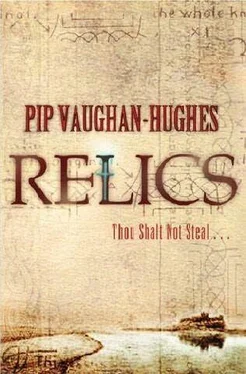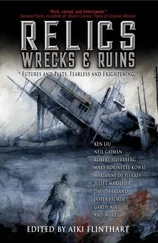Pip Vaughan-Hughes - Relics
Здесь есть возможность читать онлайн «Pip Vaughan-Hughes - Relics» весь текст электронной книги совершенно бесплатно (целиком полную версию без сокращений). В некоторых случаях можно слушать аудио, скачать через торрент в формате fb2 и присутствует краткое содержание. Жанр: Исторический детектив, на английском языке. Описание произведения, (предисловие) а так же отзывы посетителей доступны на портале библиотеки ЛибКат.
- Название:Relics
- Автор:
- Жанр:
- Год:неизвестен
- ISBN:нет данных
- Рейтинг книги:4 / 5. Голосов: 1
-
Избранное:Добавить в избранное
- Отзывы:
-
Ваша оценка:
- 80
- 1
- 2
- 3
- 4
- 5
Relics: краткое содержание, описание и аннотация
Предлагаем к чтению аннотацию, описание, краткое содержание или предисловие (зависит от того, что написал сам автор книги «Relics»). Если вы не нашли необходимую информацию о книге — напишите в комментариях, мы постараемся отыскать её.
Relics — читать онлайн бесплатно полную книгу (весь текст) целиком
Ниже представлен текст книги, разбитый по страницам. Система сохранения места последней прочитанной страницы, позволяет с удобством читать онлайн бесплатно книгу «Relics», без необходимости каждый раз заново искать на чём Вы остановились. Поставьте закладку, и сможете в любой момент перейти на страницу, на которой закончили чтение.
Интервал:
Закладка:
In all, the crew of the Cormaran was a strange stew of vagabonds, men of faith and of the sword, scholars and minstrels. These men, who almost without exception had found themselves unable to live in the everyday world, here worked together, lived together, died together. Quarrels were rare. Fights were rarer, and quickly over: although every man aboard knew war and death as well as they knew the lines of their own hands, I believe that very few of them loved violence for its own sake. And if some of the crew had little regard for each other, they were all joined in their devotion to the Captain.
And now here I was, an erstwhile monk who had been nothing but blamessly orthodox, fallen amongst Moors, Jews, Schismatics, heretics. And those where the ones who professed their faiths. Behind many others I detected closely guarded secrets. The truth was that I had fallen amongst men upon whom religion had been turned like a weapon. Yes, there were rogues like Zianni who had placed themselves beyond the laws of men and God by ill-fortune or simple choice, and men of war who knew no other life than that of violence. But perhaps the greater number of crewmen would find persecution or even death if they practised their beliefs in any country other than their own – and many were condemned out of hand in their own lands too. The only home they had, the only church or temple, was the ship. Chief among these were the group of men closest to the Captain, former subjects, like him, of the Duke of Provence. They spoke their own language, which they called Occitan, and which sounded like French and Latin stirred with honey and warm sunshine. To a man they carried some secret burden of the soul, a great anger and greater sadness within them. These men of Provence had suffered some fearful wrong, and de Montalhac, judging by their deference to him, had suffered most of all. I had heard of the dreadful wars that had afflicted their land – I was a cleric, after all, and knew of the Cathar heretics and their blasphemous, idolatrous ways – and remembered, dimly, when the news came to my abbey that the great heretic castle of Montsegur had fallen. It had meant little to a twelve-year-old novice monk, and now I wished I had paid more attention to news from the wider world. There was nothing monstrous about the Captain and his companions, though, and I confess I was filled with curiosity, although I did not have the nerve ever to enquire further.
So we made our way northwards through the Irish Sea. We had calm seas and light winds, and the land drifted by, a distant bruise on the starboard side. At first I was more or less ignored as I wandered about the ship, and I quickly found a place for myself in a corner of the forecastle where I was unlikely to interfere with anyone else's business. This suited me. My whole arm had swelled, and it ached and throbbed as if it were a sausage stuffed with tiny demons trying to find their way out. It was almost impossible to turn my head. Isaac the surgeon changed my bandages daily, prodded my shoulder, and assured me I was healing well. It did not feel so to me, and the pungent, slightly nauseating balm he pasted over the wound failed to work its magic on my spirit, although it had great effect upon my body. Within a week I could look stiffly from left to right, and the demons under my skin were beginning to lose heart. But meanwhile I felt like a cripple and a useless mouth in a place where no food, no motion appeared to be wasted. Unlike the quiet regime of my monastery, I had been thrust into a community defined by constant activity. If a man was awake, he was mending, painting, trimming the sails, steering, navigating. Even the Captain and Gilles, who to my way of thinking were the lords of the ship, never seemed to take their ease, unless it were at the supper table. But even here they were frugal, eating with one ear cocked to the sounds of the crew and the wind in the sail.
One day – it must have been our sixth day at sea, although I stopped counting soon afterwards – Fafner woke me in his usual fashion, taking my nose whole into his mouth and giving it the gentlest of nips with his great white teeth. His breath was as foul as his nature was sweet, and banished the last mists of sleep like a splash of cold water. I lay for a while, stroking the cat, until he slipped away to other entertainments and I rose and went on deck.
For the first time since leaving Dartmouth, land was clear on our starboard bow. I saw dark, low hills in a line fading to the north. Looking around, I noticed that the crew were paying little attention to the shore. But I was curious, and instead of climbing forward to my spot in the forecastle, I went aft and joined Nizam on the bridge. I had exchanged no more than a nod with the helmsman since our meeting, but he greeted me with a smile. I remembered his odd gesture of welcome and made it now, a quick touch of my fingertips to breast, mouth, forehead. He returned it with great solemnity, then roared with laughter, so much so that I feared the ship would careen off course.
'Master Nizam,' I began, cautiously, 'I see land over yonder. Do you know where we are?'
'I would be a poor helmsman if I did not,' he replied. 'Those hills are the Rinns of Galloway. We are in the North Channel – Scotland is to starboard, and Ireland will show to larboard soon. If it stays clear, you shall see the Mountains of Antrim on one side, and the Mull of Kintyre on the other. We shall clear the Channel today, and perhaps tomorrow, perhaps the day after we will be in the Minches between the Western Isles and Skye. From there, it is due north to the Faroes, and Iceland beyond.'
This was more information than I had dared to expect, and so I sought some more. 'Is this ice-land where the Skraelings dwell?' I ventured.
'No, no. Iceland is – well, it is indeed a land of ice, but that is also its name. To the north-west of Iceland is Greenland, which is more of an ice-land than Iceland – if you follow me – and still further west are Aelluland, Markland, Vineland and Skraelingeland. I see you have never heard that such places lie beyond the setting sun, but men have visited their shores for centuries – nay, men – your Skraelings are men like you and I -have lived there time out of mind. There: I have told you the last great secret of the world. But this time we go to trade with the folk of Greenland.' 'Are they not Skraelings?'
'They are Norse folk. Their forefathers were Vikings out of Iceland. They tell us that in the Viking days, Greenland was indeed green. Now it is becoming pitiful: winter has crept down on them from the north, and allows them but a grudging summer. With the ice and snow come the Inuit, Skraelings who cover their bodies in seal fat and furs, and eat their meat raw. They kill the Greenlanders whenever they can, and in return are slaughtered like vermin. But their numbers grow, while the Greenlanders grow thin and weary. We trade warm cloth for their walrus ivory, and they are horribly grateful, poor wretches.' 'Is that what the Captain does? Trade with the Norsemen?'
Yes, among other things. We are traders, it is true. But we prefer to keep our arrangements – what is your word? Ah, yes: informal. Where we are going, it is the King of Norway who holds the monopoly on trade. Bergen is where he holds court, but Bergen is far out of our way. And we would not bother the King with trivial matters. The poor man has quite enough to worry about.'
It dawned on me. 'So you are smugglers,' I said, half to myself. Realising what I had let slip, I jerked my head down in panic, wrenching the wound in my shoulder and sending a ghastly spasm of pain down my left side. Gasping, I regarded Nizam through eyes misty with tears, sure that the giant would toss me overboard like a piece of carrion for my hasty words. But instead he reached a hand across the tiller and steadied me. We are traders who keep no accounts but our own,' said another voice. We respect no borders other than the walls of this ship, pay neither toll nor tax save to our own consciences, and as for kings, each man of us is king unto himself It was the Captain; I had not heard him climb up to us. 'Fancy words. Smugglers – yes, you cut through to the quick. Does the thought trouble you?'
Читать дальшеИнтервал:
Закладка:
Похожие книги на «Relics»
Представляем Вашему вниманию похожие книги на «Relics» списком для выбора. Мы отобрали схожую по названию и смыслу литературу в надежде предоставить читателям больше вариантов отыскать новые, интересные, ещё непрочитанные произведения.
Обсуждение, отзывы о книге «Relics» и просто собственные мнения читателей. Оставьте ваши комментарии, напишите, что Вы думаете о произведении, его смысле или главных героях. Укажите что конкретно понравилось, а что нет, и почему Вы так считаете.












